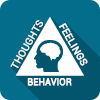What is Morality?
Morality refers to the way people choose to live their lives according to a set of guidelines or principles that govern their decisions about right versus wrong, and good versus evil.
Moral Development
As youths' cognitive, emotional, social development continue to mature, their understanding of morality expands and their behavior becomes more closely aligned with their values and beliefs. Therefore, moral development describes the evolution of these guiding principles and is demonstrated by the ability to apply these guidelines in daily life.
Early adolescence
Teens must make moral judgments on a daily basis.
-

When children are younger, their family, culture, and religion greatly influence their moral decision-making.
-

During the early adolescent period, peers have a much greater influence.
Peer pressure can exert a powerful influence because friends play a
more significant role in teens' lives.
-

Furthermore, the new ability to think
abstractly enables youth to
recognize that rules are simply created by other people. As a result, teens begin to question the absolute authority of parents, schools, government, and other traditional institutions.
Therapists are Standing By to Treat Your Depression, Anxiety or Other Mental Health Needs
Explore Your Options Today
Ad
Late Adolescence
By late adolescence, most teens are less rebellious as they have begun to establish their own identity, their own belief system, and their own place in the world.
- Some youth who have reached the highest levels of moral development may feel passionate about their moral code; as such, they may choose to participate in activities that demonstrate their moral convictions.
- For example, some college students may organize and participate in demonstrations and protests while other students may volunteer their time for projects that advance the ethical principles they hold important.
Factors that Affect Moral Development
Unfortunately, some youth have life experiences that may interfere with their moral development.
Trauma
Traumatic experiences can include:
- Physical, emotional, or sexual abuse.
- The death of a family member or close friend.
- Witnessing senseless violence.
These types of experiences can cause them to view the world as unjust and unfair.
Social Learning
Adolescents may have also observed the adults in their life making immoral decisions that disregarded the rights and welfare of others, leading these youth to develop beliefs and values that are contrary to the rest of society.
- Lacking a moral compass, these youth may never reach their full potential and may find it difficult to form meaningful and rewarding relationships with others.
Thus, while parents may find this process of moral development difficult or challenging, it is important to remember that this developmental step is essential to their children's well-being and ultimate success in life.

